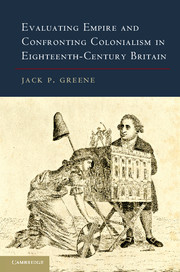Book contents
- Frontmatter
- Contents
- Preface Confronting Empire
- Prologue “Scene of a Foul Transaction”
- 1 “The Principal Cornucopia of Great-Britain's Wealth”
- 2 Outposts of “Loose Vagrant People”
- 3 “A Fabric at Once the Dread and Wonder of the World”
- 4 Arenas of “Asiatic Plunder”
- 5 Sites of Creolean Despotism
- 6 “A Fruitless, Bloody, Wasting War”
- 7 “This Voraginous Gulph of Hibernian Dependence”
- 8 A “Shadow of Our Former Glory”?
- Epilogue “Against Every Principle of Justice, Humanity, and Whatever is Allowed to be Right Among Mankind”
- Index
- References
Preface - Confronting Empire
Published online by Cambridge University Press: 05 June 2013
- Frontmatter
- Contents
- Preface Confronting Empire
- Prologue “Scene of a Foul Transaction”
- 1 “The Principal Cornucopia of Great-Britain's Wealth”
- 2 Outposts of “Loose Vagrant People”
- 3 “A Fabric at Once the Dread and Wonder of the World”
- 4 Arenas of “Asiatic Plunder”
- 5 Sites of Creolean Despotism
- 6 “A Fruitless, Bloody, Wasting War”
- 7 “This Voraginous Gulph of Hibernian Dependence”
- 8 A “Shadow of Our Former Glory”?
- Epilogue “Against Every Principle of Justice, Humanity, and Whatever is Allowed to be Right Among Mankind”
- Index
- References
Summary
During the American crisis between 1763 and 1783, the numerous critics of the British government's coercive policy were prone to ridicule those people who, although largely uninformed about the character and components of the overseas empire, nonetheless blindly supported Administration measures concerning them. Thus, in 1778, an anonymous wag calling himself a West India merchant published, in a series of letters in the London Evening Post, an alleged conversation among three members of Parliament. When one inquired of another whether he ever gave himself “the trouble of examining and considering the subject” of taxing the colonies, the second man declared: “Oh yes, that I’ve done in this case long ago.–I’m quite sartin that we are to tax the West-Indies, as well as the West of England.” “You mean the North-Americans, I suppose, Sir?,” asked the first man. “Why, you knows,” the second answered, “its all the same thing:– North-America, Bingal, Virginny, Jemaiky, is all in the Indies, only the sea folks that loves to box the compass, calls things North and East and West…and that makes it so puzzling to understand and to remember the name, and to know where all these outlandish Colonies are.” That the British public was content to be uninformed was the recurring complaint of people who had considerable experience living in or dealing with America, of whom John Fothergill, a prominent London Quaker, is a principal example. In a 1780 pamphlet, he remarked at length on the sad effects of this ignorance, which he took to be the principal explanation for “the madness and folly” of Britain's conduct of the American war. “Knowledge of america,” he lamented, was “confined to the Merchants, and Traders chiefly. It was a country talked of, but no people, save those immediately interested in its produce, knew any thing about it.”
- Type
- Chapter
- Information
- Publisher: Cambridge University PressPrint publication year: 2013



